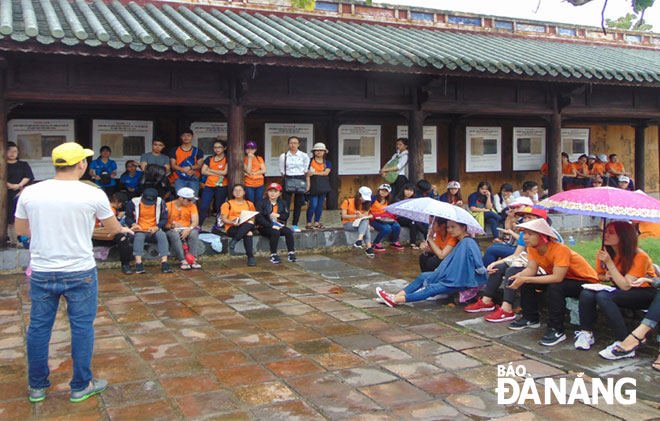Importance of real-world experience for students
The application of work-based learning (WBL) method into training programmes have proved highly effective in helping public and private universities and junior colleges across Da Nang to raise the rate of their graduates who find it easier to seek job opportunities.
 |
| Students from the Faculty of Tourism at the Duy Tan University joining in a WBL event |
WBL is an educational strategy that provides students with real-world experience where they can apply academic and technical skills and develop their employability. It is a series of educational courses which integrate the school or university curriculum with the workplace to create a different learning paradigm.
Work-based learning deliberately merges theory with practice and acknowledges the intersection of explicit and tacit forms of knowing.
Mr Huynh Van Son, the Deputy Director of Business Cooperation Centre of the city-based Duy Tan University, said that this tertiary establishment has to date entered into Memoranda of Understanding with a total of about 300 businesses to create favourable conditions for its students to gain work experience.
Most WBL programmes are generally university accredited courses, aiming at a win-win situation where the learner's needs and the industry requirement for skilled and talented employees both are met. WBL programmes are targeted to bridge the gap between the learning and the doing.
WBL strategies provide career awareness, career exploration opportunities, career planning activities. In addition, they help students attain competencies such as positive work attitudes and other employable skills.
WBL encompasses a diversity of formal, non-formal and informal arrangements including apprenticeships, work placement, and informal learning on the job.
Mr Son added that there has been a growing tendency of many students from the Faculty of Tourism applying for part-time jobs at local businesses so as to earn money and gain hands-on experience in the work environment as well.
Ms Nguyen Thi Quynh Hoa, the Deputy Dean of the Faculty of the English Language at the Da Nang University of Foreign Languages and Studies said the final-year students are always offered 8-week-long internships in the last semester of their 4-year tertiary courses. Accordingly, interns usually have the chance to be involved in such job tasks using English as international transactions, text editing, and translation.
The WBL method has received a high applause from students. Nguyen Chi Bao, a freshman whose major is tourism and hospitality management at the Duy Tan University, for instance, said he gained valuable hands-on work experience through his participation in a recently-held WBL course at a local high-end hotel.
Such a highly practical WBL event benefits the students in a number of ways, by allowing them to assess their interests, aptitudes, and abilities while learning about the career possibilities available to them, and opens up post-graduation employment opportunities for them through the acquisition of specific training and skills.
Also, the students have the chance to develop and practise positive work-related habits and attitudes including the ability to think critically, solve problems, work in teams, and resolve issues, and have more understanding about the expectations of the workplace.
Many local universities and junior colleges have been attaching importance to promoting WBL, a practical learning approach under the framework of the ongoing ‘The US Agency for International Development Connecting the Mekong through Education and Training (USAID COMET)’ project.
Assoc. Prof. Dr. Phan Minh Duc, the Vice Rector of the Da Nang University of Technology and Science underlined a must-do to promote the WBL model which is seen as an important educational track that provides the students with the skills necessary for a smooth transition into the labour market.